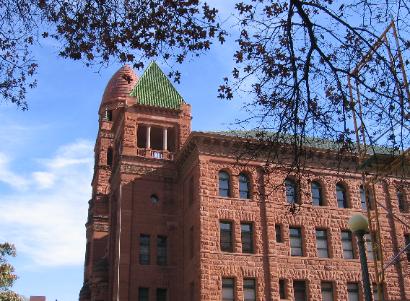
| San Antonio Court of Appeals Links Tex.App.- San Antonio [4th Dist.] |
|
|



CAVEAT APPELLANT - CASELAW CLIPS FROM THE SAN ANTONIO COURT OF APPEALS
ILLUSTRATING COMMON ERRORS ON APPEAL
The Texas Rules of Appellate Procedure provide that an appellant’s brief “must contain a clear and concise argument for the
contentions made, with appropriate citations to authorities and to the record.” TEX. R. APP. P. 38.1(i); Kang v. Hyundai Corp.,
992 S.W.2d 499, 503 (Tex. App.—Dallas 1999, no pet.). When an issue is inadequately briefed by failing to provide citation to
authority, nothing is presented for our review. Mass Mktg. Ltd. v. Durbin, No. 04-09-00697-CV, 2010 WL 4109260, at *7 (Tex.
App.—San Antonio Oct. 20, 2010, pet. denied) (mem. op.). Issues raised on appeal, but not properly briefed, are waived.
Radenovich v. Eric D. Fein, P.C. & Assocs., 198 S.W.3d 858, 861 (Tex. App.—Dallas 2006, no pet.).
To the extent [APPELLANT] complains about the sanctions portion of the order, we conclude Singleton has waived any
possible error. See TEX. R. APP. P. 38.1(i); Durbin, 2010 WL 4109260, at *7. [Appellant’s] brief contains no citations to any
legal authority. When an appellant’s brief fails to contain a clear and concise argument for the contentions made with
appropriate citations to authorities, the appellate court is not responsible for doing the legal research that might support a
party’s contentions. Bolling v. Farmers Branch Indep. School Dist., 315 S.W.3d 893, 895 (Tex. App.—Dallas 2010, no pet.). If
we were to do so, we would be abandoning our role as judges and assuming the role of advocate for that party. Id. We
conclude Singleton has waived any error relating to sanctions by failing to properly brief these issues.
We hold [appellant] has waived its sufficiency challenge to the amount of damages by failing to properly brief the issue. Rule
38.1(i) of the Texas Rules of Appellate Procedure requires an appellant’s brief to contain a clear and concise argument for the
contentions made. TEX. R. APP. P. 38.1(i). This requirement is not satisfied by conclusory statements. Taylor v. Meador, 326 S.
W.3d 682, 683 (Tex. App.—El Paso 2010, no pet.); see Eastin v. Dial, 288 S.W.3d 491, 501 (Tex. App.—San Antonio 2009, pet.
denied) (holding contention that affidavit in support of attorney’s fees was conclusory was waived for failure to present
argument or cite authority). A failure to provide substantive analysis of an issue waives the complaint. Id.
Although [PARTY] attempts to address each of the grounds in his reply brief, an appellant is not permitted to raise an issue in
a reply brief which was not included in his original brief. See Ritter v. Las Colonitas Condo. Ass’n, 319 S.W.3d 884, 891-92
(Tex. App.—Dallas 2010, no pet.); Moore v. City of Wylie, 319 S.W.3d 778, 781 (Tex. App.—El Paso 2010, no pet.).
APPEAL OF SUMMARY JUDGMENT - MUST CHALLENGE ALL BASIS IN MOTION IF TRIAL COURT DID
NOT STATE BASIS IN THE ORDER GRANTING IT
Although [Appellant's] broadly-worded issue complaining that the trial court erred in granting summary judgment was sufficient
to preserve error and place all grounds upon which the summary judgment could have been granted before this court for
consideration, [Appellant] is still required to present argument and authorities in his brief challenging each of the possible
bases for summary judgment. Verner v. Nat’l Oilwell Varco, Inc., No. 08-09-00244-CV, 2011 WL 2471891, at *3 (Tex. App.—El
Paso June 22, 2011, no pet. h.) (mem. op.); Dovalina v. Laredo Morning Times, No. 04-07-00480-CV, 2008 WL 372511 (Tex.
App.—San Antonio Feb. 13, 2008, no pet.) (mem. op.); Henriquez v. Cemex Mgmt., Inc., 177 S.W.3d 241, 255 (Tex. App.—
Houston [1st Dist.] 2005, pet. denied); Cruikshank v. Consumer Direct Mortg., Inc., 138 S.W.3d 497, 502–03 (Tex. App.—
Houston [14th Dist.] 2004, pet. denied); Smith v. Tilton, 3 S.W.3d 77, 83, 84 (Tex. App.—Dallas 1999, no pet.); TEX. R. APP. P.
38.1(i). Because [Appellant's] brief does not contain such argument and authorities, we affirm the trial court’s judgment.
COST UPON DISMISSAL
Appellant [...] filed a motion to dismiss this appeal. We grant the motion. See TEX. R. APP. P. 42.1(a)(1). We order all costs
assessed against appellant. See TEX. R. APP. P. 42.1(d)(absent agreement of the parties, costs are taxed against appellant).
NECESSITY OF COMPLETE APPELLATE RECORD
We cannot consider whether a trial court has erred or whether a party has been prejudiced by any error unless the record
relating to the alleged error is before us. Foust v. Estate of Walters, 21 S.W.3d 495, 504 (Tex. App.—San Antonio 2000, pet.
denied).
STANDARDS OF REVIEW ON APPEAL
APPEAL FROM BENCH TRIAL: In an appeal from a bench trial, a trial court’s findings of fact have the same weight as a
jury’s verdict, and are reviewed for legal and factual sufficiency of the evidence. See In re Doe, 19 S.W.3d 249, 253 (Tex.
2000); Ortiz v. Jones, 917 S.W.2d 770, 772 (Tex. 1996). “When the appellate record contains a reporter’s record as it does in
this case, findings of fact are not conclusive on appeal if the contrary is established as a matter of law or if there is no
evidence to support the findings.” See Ramsey v. Davis, 261 S.W.3d 811, 815 (Tex. App.—Dallas 2008, pet. denied) (citation
omitted).
Because the trial court acts as fact-finder in a bench trial, it is the sole judge of the credibility of witnesses. See Murff v. Murff,
615 S.W.2d 696, 700 (Tex. 1981); HTS Servs., Inc. v. Hallwood Realty Partners, L.P., 190 S.W.3d 108, 111 (Tex. App.—Houston
[1st Dist.] 2005, no pet.).
ERROR PRESERVATION REQUIREMENT AND EXCEPTION TO THE RULE
Rule 33.1(a) of the Texas Rules of Appellate Procedure states that before a complaint can be
Presented for appellate review, the record must show the complaint was presented to the trial court by “timely request,
objection, or motion” that states the ground for the ruling sought with sufficient specificity to make the trial court aware of the
complaint, and the trial court ruled. TEX. R. APP. P. 33.1(a). The only exceptions to the preservation requirement of Rule 33.1
(a) in civil cases are rare instances of “fundamental error,” which the supreme court has held includes cases in which the face
of the record shows the court lacked jurisdiction or in certain types of error in juvenile delinquency cases. In re B.L.D., 113 S.W.
3d 340, 350 (Tex. 2003). Even constitutional error can be waived if not raised in the trial court. See In re L.M.I., 119 S.W.3d 707,
711 (Tex. 2003); City of San Antonio v. Schautteet, 706 S.W.2d 103, 104 (Tex. 1986) (per curiam).
EVIDENTIARY ERROR AS BASIS FOR APPEAL
To obtain reversal for an erroneous exclusion or admission of evidence, the appellant must establish the error was harmful,
that is, it was calculated to cause and probably did cause the rendition of an improper judgment. Doncaster, 161 S.W.3d at
601; TEX. R. APP. P. 44.1(a). Errors in admission or exclusion of evidence are generally not reversible unless the appellant
can show the whole case turns on the complained of evidence. Doncaster, 161 S.W.3d at 601 (citing Interstate Northborough
P’ship v. State, 66 S.W.3d 213, 220 (Tex. 2001); Atl. Mut. Ins. Co. v. Middleman, 661 S.W.3d 182, 185 (Tex. App.—San Antonio
1983, writ ref’d n.r.e.)).
APPEAL FOR GRANT OR DENIAL OF PLEA TO THE JURISDICTION
Subject matter jurisdiction is a question of law that is reviewed de novo. Tex. Dep’t of Parks & Wildlife v. Miranda, 133 S.W.3d
217, 226 (Tex. 2004); Tex. Nat’l Res. Conservation Comm’n v. IT-Davy, 74 S.W.3d 849, 855 (Tex. 2002). When a plea to the
jurisdiction challenges the plaintiff’s pleadings, the court must determine if, construing the pleadings liberally in the plaintiff’s
favor, the plaintiff has alleged facts affirmatively demonstrating the trial court’s jurisdiction to hear the case. Miranda, 133 S.W.
3d at 226; Tex. A & M Univ. Sys. v. Koseoglu, 233 S.W.3d 835, 839-40 (Tex. 2007).
When a plea to the jurisdiction challenges the existence of jurisdictional facts, the court looks beyond the plaintiff’s pleadings
and considers the relevant evidence submitted by the parties to resolve the jurisdictional issues. Miranda, 133 S.W.3d at 227;
Bland Indep. Sch. Dist. v. Blue, 34 S.W.3d 547, 555 (Tex. 2000). If the evidence of jurisdictional facts is undisputed, or fails to
raise a fact question on the issue of jurisdiction, the trial court may rule on the plea as a matter of law. Miranda, 133 S.W.3d at
228. However, if the evidence creates a fact question on the jurisdictional issue, the trial court must deny the plea and submit
the disputed fact issue to the fact finder for resolution. Id. at 227-28; City of Elsa v. Gonzalez, 325 S.W.3d 622, 625 (Tex. 2010).
In reviewing a ruling on a plea to the jurisdiction, the appellate court applies a standard of review that generally mirrors the
traditional summary judgment standard of review. Miranda, 133 S.W.3d at 228. The governmental entity is required to meet the
summary judgment standard of proof for its assertion that the trial court lacks jurisdiction, i.e., no disputed issue of material
fact. Id. Then, the plaintiff must show there is a disputed material fact regarding the jurisdictional issues to defeat the
government’s plea to the jurisdiction. Id. The appellate court takes as true all evidence favorable to the non-movant, and
resolves any doubts and indulges every reasonable inference in the non-movant’s favor. Id. The appellate court does not look
to the merits of the cause of action, but considers only the pleadings and the evidence relevant to the jurisdictional inquiry. Id.
at 227; County of Cameron v. Brown, 80 S.W.3d 549, 555 (Tex. 2002). 04-11-00113-CV
A plea to the jurisdiction based on sovereign immunity challenges a trial court’s jurisdiction. State v. Holland, 221 S.W.3d 639,
642 (Tex. 2007). Such a plea raises a question of law that we review de novo. Id. We focus first on the plaintiff’s petition to
determine whether the facts pled affirmatively demonstrate that jurisdiction exists. Id. We construe the pleadings liberally,
looking to the pleader’s intent. Id. at 643. If the pleadings are insufficient to establish jurisdiction but do not affirmatively
demonstrate an incurable defect, the plaintiff should be afforded the opportunity to replead. Id. In some instances, however, a
plea to the jurisdiction may require the court to consider evidence pertaining to the jurisdictional facts. Id. A plea should not be
granted if a fact issue is presented as to the court’s jurisdiction, but if the relevant undisputed evidence negates jurisdiction,
then the plea to the jurisdiction must be granted. Id.
MANDAMUS UNAVAILABLE TO CHALLENGE GROUNDS FOR NEW-TRIAL ORDER
Relator filed a petition for writ of mandamus, asking us to review the trial court’s reasons for granting a new trial. However, we
recently held that such mandamus review is not available. See In re Camp Mystic, Inc., No. 04-10-00766-CV (Tex. App.—San
Antonio Oct. 5, 2011, orig. proceeding) (mem. op.), available at http://www.4thcoa.courts.state.tx.us/opinions/docket.asp?
FullDate=20111005. Accordingly, the petition for writ of mandamus is DENIED. See TEX. R. APP. P. 52.8(a).